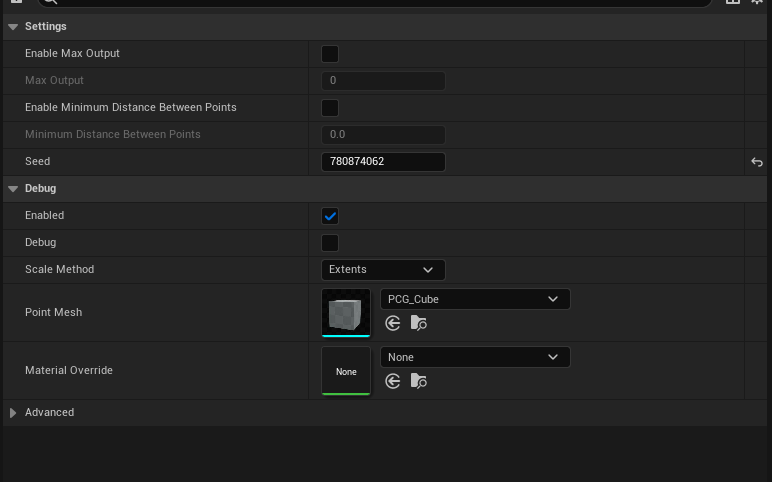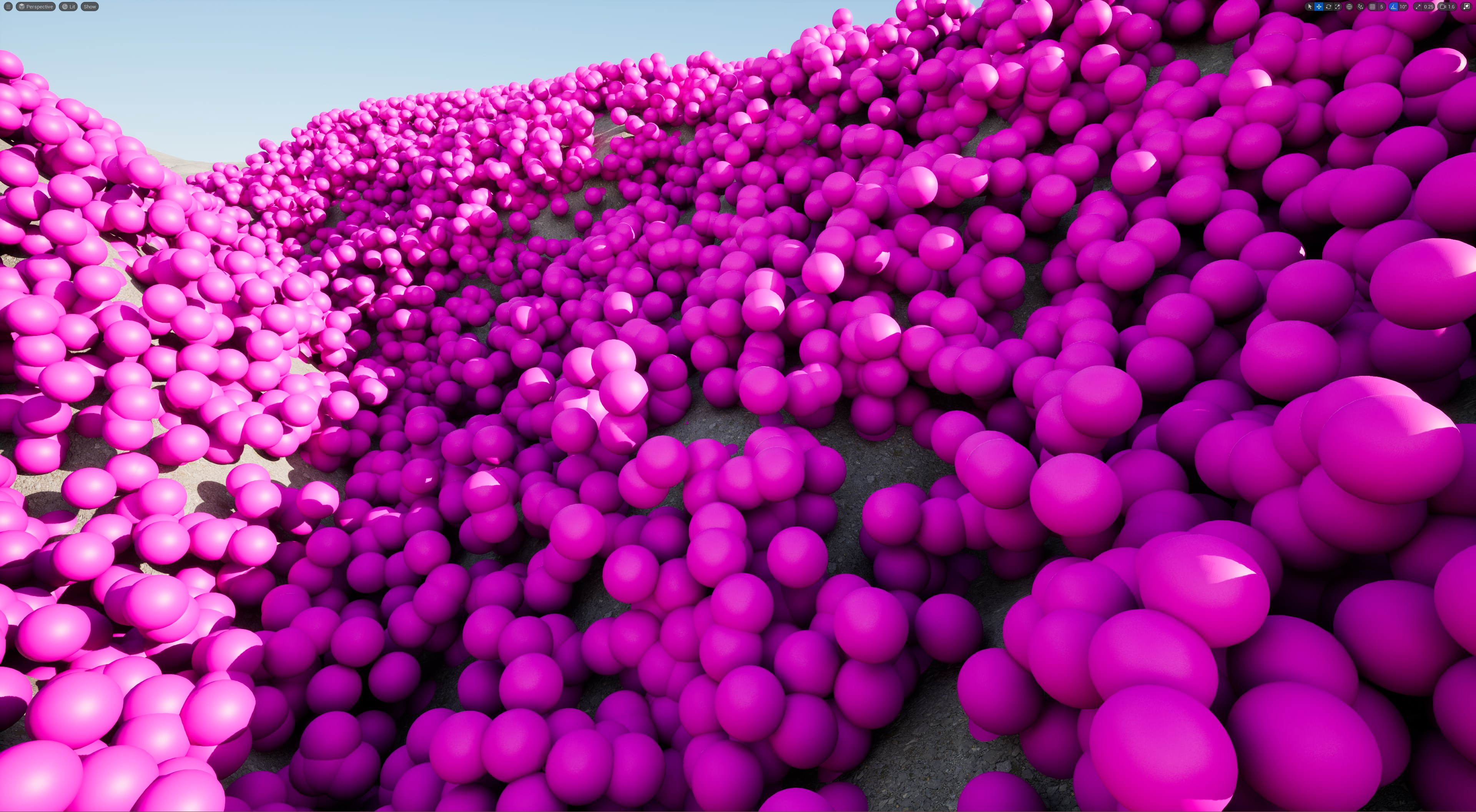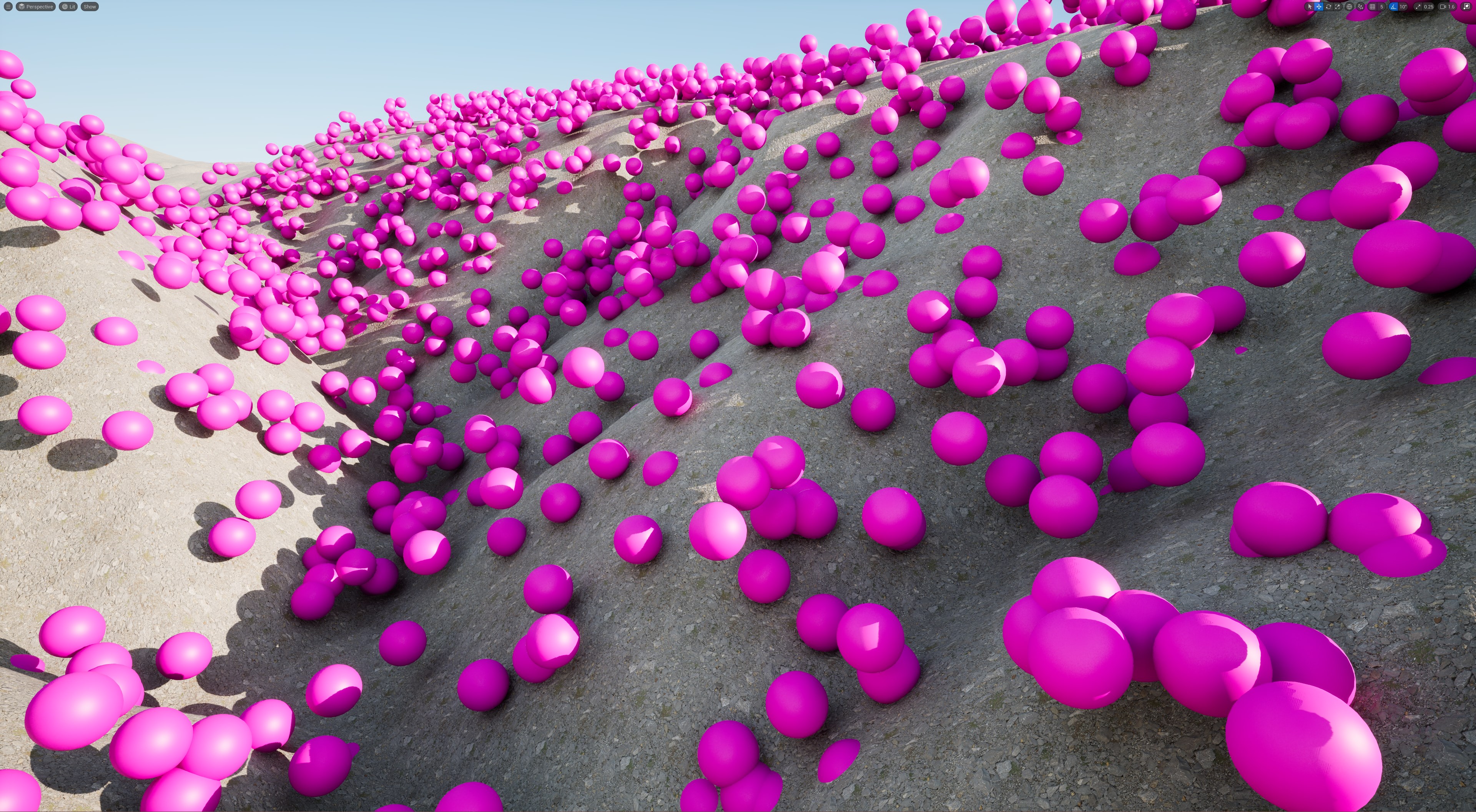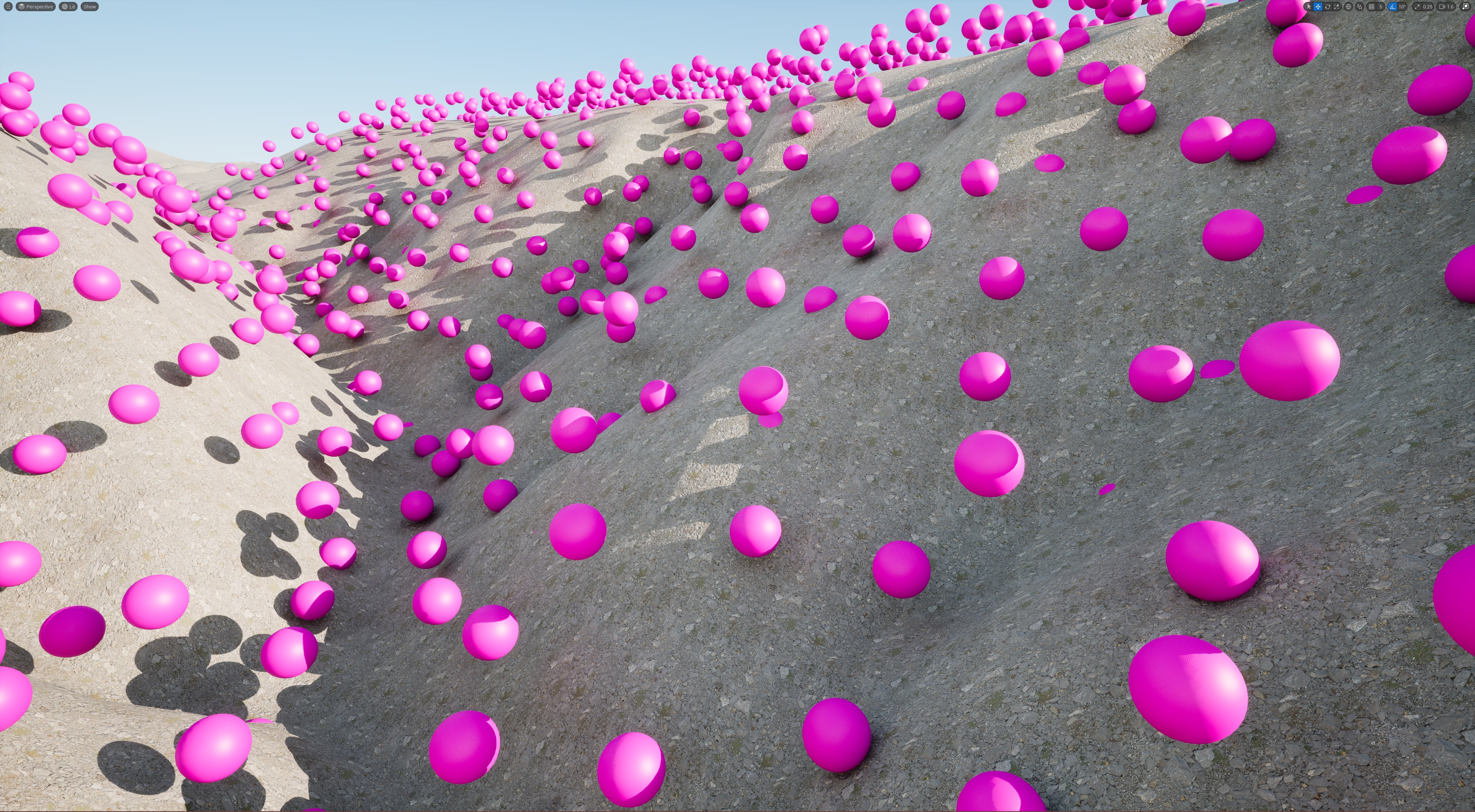Holodeck Dev Blog: The Awesome Random Filter Node for PCG
Hey everyone! I'm super excited to share something I've been working on: a custom Random Filter node for the Procedural Content Generation (PCG) framework in Unreal Engine. This node is a game-changer for filtering input points randomly while ensuring they meet specific conditions. Let's dive into the cool features and variables of this node.
Features of the Random Filter Node
Random Point Selection
At its core, this filter node takes all the input points and filters them down to a random few. By default, any point in the list can be selected, giving you a broad range of possibilities.
Minimum Distance Between Points
One of the standout features is the bEnableMinimumDistanceBetweenPoints option. When enabled, it ensures that if a point is selected, no other point within the specified minimum distance will be selected. This is incredibly useful for maintaining a certain spacing between points in your PCG setup.
Maximum Output Points
Another handy feature is the bEnableMaxOutput option. When enabled, you can specify the maximum number of points to output, providing fine control over the density of points.
Key Variables
Here's a quick rundown of the main variables you can tweak:
- bEnableMaxOutput: Enables the maximum number of points to output.
- MaxOutput: The maximum number of points to output when
bEnableMaxOutputis enabled. - bEnableMinimumDistanceBetweenPoints: Ensures selected points maintain a minimum distance from each other.
- MinimumDistanceBetweenPoints: The minimum distance to maintain between points when
bEnableMinimumDistanceBetweenPointsis enabled.
Details Panel
Check out what the properties look like in the Unreal Engine details panel:

Using the Node in a World
Here's an example of how I've been using this node with PCG points in a world. You can see how it filters points to create a more natural and controlled distribution:

Filter the points to a maximum of 4000:

Filter 4000 points with a minimum of 250cm between each point:

Source Code
For those interested in the source code, here's a snippet of the Random Filter node implementation:
// PCGRandomFilterSettings.h
// Copyright Hitbox Games, LLC. All Rights Reserved.
#pragma once
#include "PCGSettings.h"
#include "PCGRandomFilterSettings.generated.h"
UCLASS(BlueprintType, ClassGroup="Procedural")
class PCGEXTENSIONS_API UPCGRandomFilterSettings : public UPCGSettings
{
GENERATED_BODY()
public:
UPCGRandomFilterSettings();
public:
//~Begin UPCGSettings interface
#if WITH_EDITOR
virtual FName GetDefaultNodeName() const override { return FName(TEXT("RandomFilter")); }
virtual FText GetDefaultNodeTitle() const override { return NSLOCTEXT("PCGRandomFilterSettings", "NodeTitle", "Random Filter"); }
virtual EPCGSettingsType GetType() const override { return EPCGSettingsType::Filter; }
#endif
protected:
virtual TArray<FPCGPinProperties> InputPinProperties() const override { return Super::DefaultPointInputPinProperties(); }
virtual TArray<FPCGPinProperties> OutputPinProperties() const override { return Super::DefaultPointOutputPinProperties(); }
virtual FPCGElementPtr CreateElement() const override;
//~End UPCGSettings interface
public:
UPROPERTY(BlueprintReadWrite, EditAnywhere, Category="Settings", meta = (PCG_Overridable))
bool bEnableMaxOutput = false;
/** Sets the maximum number of points to output */
UPROPERTY(BlueprintReadWrite, EditAnywhere, Category="Settings", meta = (ClampMin=0, UIMin=0, EditCondition="bEnableMaxOutput", PCG_Overridable))
int32 MaxOutput = 0;
UPROPERTY(BlueprintReadWrite, EditAnywhere, Category="Settings", meta = (PCG_Overridable))
bool bEnableMinimumDistanceBetweenPoints = false;
UPROPERTY(BlueprintReadWrite, EditAnywhere, Category="Settings", meta = (ClampMin=0, UIMin=0, EditCondition="bEnableMinimumDistanceBetweenPoints", PCG_Overridable))
float MinimumDistanceBetweenPoints = 0.f;
};
class PCGEXTENSIONS_API FPCGRandomFilterElement : public IPCGElement
{
protected:
virtual bool ExecuteInternal(FPCGContext* Context) const override;
};// PCGRandomFilterSettings.cpp
// Copyright Hitbox Games, LLC. All Rights Reserved.
#include "PCG/Elements/PCGRandomFilterSettings.h"
#include "PCGContext.h"
#include "Data/PCGPointData.h"
#include "Data/PCGSpatialData.h"
#include "Helpers/PCGAsync.h"
#include UE_INLINE_GENERATED_CPP_BY_NAME(PCGRandomFilterSettings)
#define LOCTEXT_NAMESPACE "PCGRandomFilterElement"
UPCGRandomFilterSettings::UPCGRandomFilterSettings()
: Super()
{
bUseSeed = true;
}
FPCGElementPtr UPCGRandomFilterSettings::CreateElement() const
{
return MakeShared<FPCGRandomFilterElement>();
}
bool FPCGRandomFilterElement::ExecuteInternal(FPCGContext* Context) const
{
TRACE_CPUPROFILER_EVENT_SCOPE(FPCGRandomFilterElement::Execute)
const auto Settings = Context->GetInputSettings<UPCGRandomFilterSettings>();
check(Settings)
TArray<FPCGTaggedData> Inputs = Context->InputData.GetInputs();
TArray<FPCGTaggedData>& Outputs = Context->OutputData.TaggedData;
const bool bEnableMaxOutput = Settings->bEnableMaxOutput;
const int32 MaxOutput = Settings->MaxOutput;
const bool bEnableMinimumDistanceBetweenPoints = Settings->bEnableMinimumDistanceBetweenPoints;
const float MinimumDistanceBetweenPoints = Settings->MinimumDistanceBetweenPoints;
const int Seed = Context->GetSeed();
// Use implicit capture, since we capture a lot
//ProcessPoints(Context, Inputs, Outputs, [&](const FPCGPoint& InPoint, FPCGPoint& OutPoint)
for (const FPCGTaggedData& Input : Inputs)
{
TRACE_CPUPROFILER_EVENT_SCOPE(FPCGTransformPointsElement::Execute)
const UPCGSpatialData* SpatialData = Cast<UPCGSpatialData>(Input.Data);
FPCGTaggedData& Output = Outputs.Add_GetRef(Input);
if (!SpatialData)
{
PCGE_LOG(Error, GraphAndLog, LOCTEXT("InputMissingSpatialData", "Unable to get Spatial data from input"));
continue;
}
const UPCGPointData* PointData = SpatialData->ToPointData(Context);
if (!PointData)
{
PCGE_LOG(Error, GraphAndLog, LOCTEXT("InputMissingPointData", "Unable to get Point data from input"));
continue;
}
const TArray<FPCGPoint>& Points = PointData->GetPoints();
// Cache the indices of the points we want to check.
// We delete points that are confirmed to be out of range
TArray<int32> PointIndicesToCheck;
PointIndicesToCheck.Reserve(Points.Num());
for (int32 i = 0; i < Points.Num(); ++i)
{
PointIndicesToCheck.Add(i);
}
TSet<int32> SelectedPointIndices;
FRandomStream RandomStream(Seed);
if (bEnableMinimumDistanceBetweenPoints)
{
const int32 TargetNumOfPoints = bEnableMaxOutput ? FMath::Min(MaxOutput, Points.Num()) : Points.Num();
while (SelectedPointIndices.Num() < TargetNumOfPoints)
{
if (PointIndicesToCheck.Num() == 0)
break; // Break if we've checked all points
// Generate a random index to check
const int32 RandIndex = RandomStream.RandRange(0, PointIndicesToCheck.Num() - 1);
// Get the PointIndex from PointIndicesToCheck using the RandIndex. Then get the point's location.
const int32 RandomPointIndexToCheck = PointIndicesToCheck[RandIndex];
const FVector RandomCandidatePoint = Points[RandomPointIndexToCheck].Transform.GetLocation();
bool bIsFarEnough = true;
for (const int32 SelectedPointIndex : SelectedPointIndices)
{
if (SelectedPointIndex == RandomPointIndexToCheck)
continue; // Skip if we're comparing the same point
const FVector& SelectedPoint = Points[SelectedPointIndex].Transform.GetLocation();
if (FVector::DistSquared(RandomCandidatePoint, SelectedPoint) < FMath::Square(MinimumDistanceBetweenPoints))
{
bIsFarEnough = false;
break;
}
}
// Add the point if it's far enough from its nearest neighbor
if (bIsFarEnough || SelectedPointIndices.IsEmpty())
{
SelectedPointIndices.Add(RandomPointIndexToCheck);
PointIndicesToCheck.RemoveAt(RandIndex);
}
else
{
PointIndicesToCheck.RemoveAt(RandIndex);
}
}
}
else if (bEnableMaxOutput)
{
// Not filtering by min distance. Just get random points until max output
while (SelectedPointIndices.Num() < MaxOutput && SelectedPointIndices.Num() < Points.Num())
{
const int32 RandIndex = RandomStream.RandRange(0, Points.Num() - 1);
SelectedPointIndices.Add(PointIndicesToCheck[RandIndex]);
}
}
else
{
SelectedPointIndices = TSet(PointIndicesToCheck);
}
// Prepare output data
auto OutputData = NewObject<UPCGPointData>();
OutputData->InitializeFromData(PointData);
TArray<FPCGPoint>& OutputPoints = OutputData->GetMutablePoints();
OutputPoints.Reserve(bEnableMinimumDistanceBetweenPoints ? SelectedPointIndices.Num() : Points.Num());
Output.Data = OutputData;
FPCGAsync::AsyncPointProcessing(Context, Points.Num(), OutputPoints, [&](int32 Index, FPCGPoint& OutPoint) -> bool
{
if (SelectedPointIndices.Contains(Index))
{
const FPCGPoint& InPoint = Points[Index];
OutPoint = InPoint;
return true;
}
return false;
});
}
return
true;
}
#undef LOCTEXT_NAMESPACE